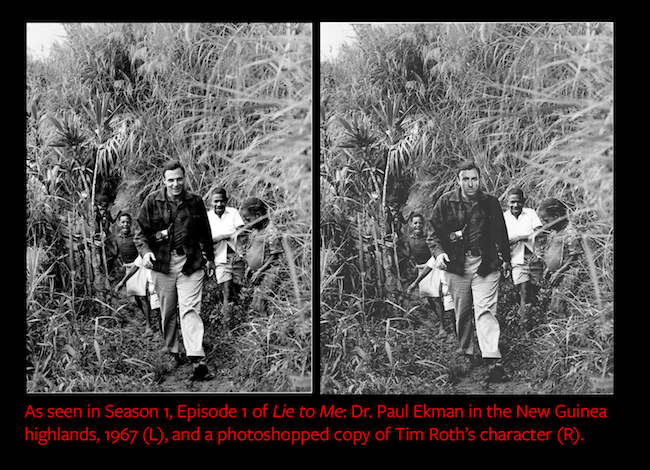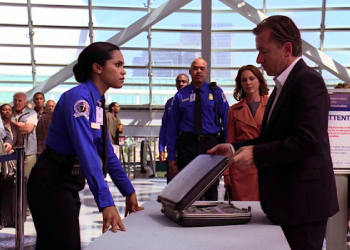The Truth about the Lie to Me TV Series
Dr. Paul Ekman PhD
 The beginning
The beginning
It was the very successful producer Brian Grazer’s idea, not mine. Googling him, I learned that Brian had produced A Beautiful Mind, and many other blockbusters. One of his assistants called, asking for a meeting to discuss creating a TV series based on my research. Would I fly down to L.A. (at Brian’s expense) to discuss it, he asked? I told his assistant that planes fly both ways; if they came up here I would be glad to explore it further and if I didn’t have to travel I wouldn’t charge them for the first hour of my time. He didn’t budge; months went by. Then when I had to be in L.A. to meet with some friends living there on another matter, I let the assistant know I could be available.
Lie to Me on my terms
Before I was fully seated in Brian’s Beverly Hills office, I told him I wasn’t interested in a TV series based on my work. David Nivens, who would become the producer of the TV series, explained they were going to do the series with or without me. Because of my writings and previous TV interviews, my cooperation wasn’t essential. However, If I did cooperate, Nivens explained, I would be able to have some control over what they created, they would pay me for my time, I would be able to review each script before it was shot and make suggestions (which I later learned they didn’t have to follow) and I could rule certain subjects out. I said they could not use anything about my meetings with the Dalai Lama, and they agreed.
I also said that the actor who was to play the scientist researching deception (me) could not be an American, Jewish, married, have children, or a personality similar to mine. I thought these constraints would give me some privacy, as he wouldn’t be much like me. Tim Roth fit my requirements and was recruited to play Dr. Lightman, the deception researcher. I met Sam Baum, a young writer who was to supervise the team of writers they hired, and read one of his short stories. I liked Sam, and found his writing sample impressive. Over the next year I was to go down to the film studio in L.A. nearly every week, answering many questions from the writers, and sometimes coaching the actors about how to make a particular facial expression. It was a lot of fun but too demanding, given my other commitments, which is why I invited my former student, Erika Rosenberg, to share some of the work.
Behind the scenes
The producers did show me the scripts a few days before they were shot, but sometimes kept in the script ideas I told them had no scientific basis or were contradicted by the science. Their defense: ‘It’s so helpful for the story, we can’t take it out’. To deal with my complaints, they agreed to put on their website a weekly blog I wrote entitled, “The Truth about Lie to Me – Separating the Facts from the Fiction.” I opened the blog with the caution that because they had only about fifty minutes for each program, problems had to be solved more quickly than I was usually able to do in real life and with more certainty than I usually had. Despite my cautionary warning I worried that program viewers when later sitting on a jury would mistakenly think they could tell whether a criminal suspect was lying. The price paid, unfortunately, for putting lie-catching on the front burner for the American public.
In the three years that the show ran, 48 episodes were aired, with the first one on January 21, 2009. The series won a People’s Choice Award for Favorite TV Crime Drama in 2011. It was shown in many countries; I still get inquiries when it plays somewhere around the world.
Everything went smoothly except for dealing with certain cast members. There were some who had trouble memorizing their lines, a necessity because TV production shoots each scene multiple times from different angles, weaving them together later. Eventually, Tim Roth became increasingly dissatisfied having to talk about science, even though he was playing a scientist. Market research had shown that the popularity of the show (and it was a hit) was in part, at least, due to what viewers said they learned by watching it.
In the end, the producers had no choice, sneaking in as much as they could before Tim would refuse to do any more. The ratings went down along with the amount of science in each program. In the market research done to find out why, viewers complained that they were no longer learning anything about lying. I didn’t really care, as after the first year the show had accomplished what I sought: bring public attention to the issues involved in lying and lie-catching.
Life after Lie to Me
On my weekly blog (“The Truth about Lie to Me”), I invited people to go to my website and subscribe to a free newsletter, which over time developed 140,000 subscribers. Through the publicity I received because of Lie to Me, I met Ariana Huffington, who gave me a named platform on her Huffington Post. I continue to put the short pieces I write in that platform about twice a month and also mail them to the newsletter subscribers. I resist the temptation to give my opinions about current events, trying to only comment on those matters that directly pertain to my areas of expertise.
After the first very successful year of Lie to Me, the writer/show runner, Sam Baum, resigned after responding to the complaints of his fiancé that she never saw him. (They then married and now have two children.) Once Sam left, Grazer brought in a new team of writers, who had been successful in writing about crime in Chicago. They knew nothing about my work and didn’t seem to want to know. I had little contact with them and withdrew from involvement in the show, unless pressed. I rarely was.
One lasting personal benefit of the show was learning about Arnold Palmers, a drink that mixes iced tea with lemonade. It was the favorite of the Hollywood executives I lunched with in their officials-only dining room. It remains my favorite drink.
Dr. Paul Ekman is a well-known psychologist and co-discoverer of micro expressions. He was named one of the 100 most influential people in the world by TIME magazine in 2009. He has worked with many government agencies, domestic and abroad. Dr. Ekman has compiled over 40 years of his research to create comprehensive training tools to read the hidden emotions of those around you. To learn more, please visit: www.paulekman.com.



